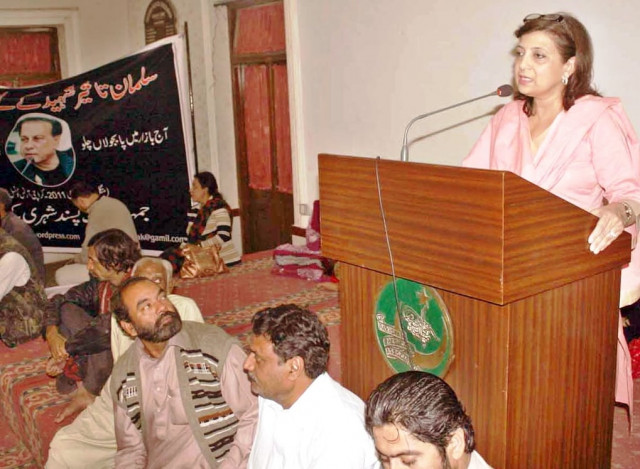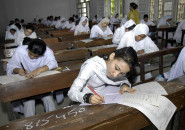Memorial for Taseer held as doctors fear for security
Activists say the blasphemy law should be amended.

“The meeting could have easily been arranged at the Karachi Press Club or at the Arts Council,” said a senior member of the PMA. The reason for his anxiety, he explained, is not the meeting but the repercussions it might have for the doctors.
“Discussing the blasphemy law on theological grounds is useless since it will only bring about conflicts rather than solutions,” said Mansoor Raza, a member of the CFD.
Giving a presentation on the law, he pointed out the fact that the blasphemy law does not have a clear definition and that makes it easy for anyone to come up with their own interpretations.
According to the research carried out by the CFD, 278 cases of blasphemy have been filed in the Punjab alone. So far, 263 cases have been filed against Ahmadis.
A 15-minute documentary was also screened, in which Islamic scholars, journalists, alleged victims and their families spoke about the impact of such a law on the society.
Supreme Court Bar Association President Asma Jahangir said that when Ziaul Haq was amending these laws, he was testing the waters and when no one protested against it, he went on to make it a full-fledged law. Maulana Farooq Maududi, an Islamic scholar interviewed in the documentary, said that the blasphemy law is not applicable to non-Muslims at all and those who are targeting them without any reason are the real blasphemers.
Fashion journalist Mohsin Sayeed read out a letter by Taseer’s family, which stated: “We are devastated by the loss of our father. Each one of us loved him dearly. He taught us to stand by our beliefs and values. His death is a loss is to our nation where [the] majority is poor and defenceless. He pushed for progress because he wanted the weak-willed to be strong and the hungry to be fed properly. We are proud of the way he lived and died.”
Venue change
The event had been originally organised at the Arts Council but just a day before the memorial, the council withdrew permission, citing “situation in the city” as the cause.
A PMA doctor said that the right-wing forces had persuaded the Arts Council to withdraw the permission. “But what about us? What would happen if we were targeted?” he asked. The members recalled how several years ago, activists of an ethnic political party created quite a ruckus because a yearly marathon at the PMA was scheduled without taking them into “confidence.” With that incident fresh in their minds, the doctors were quite apprehensive about what could happen in these sensitive situations. Before the meeting started, a Rangers vehicle patrolled the area and assured they would provide security.
However, despite the apprehensions, the meeting finished without any untoward incidents, which was appreciated by the Information Secretary for the Pakistan People’s Party, Fauzia Wahab.
On her way to the venue she had seen posters and wall chalking, in which Taseer’s alleged assassin, Mumtaz Qadri, was being heralded as a hero. These really disturbed me, she said.“We have to make a decision once and for all where we want Pakistan to be. The decision to hold this meeting was a right one.” Wahab said.
Adviser Kaiser Bengali also attended the memorial.
Published in The Express Tribune, January 19th, 2011.



















COMMENTS
Comments are moderated and generally will be posted if they are on-topic and not abusive.
For more information, please see our Comments FAQ